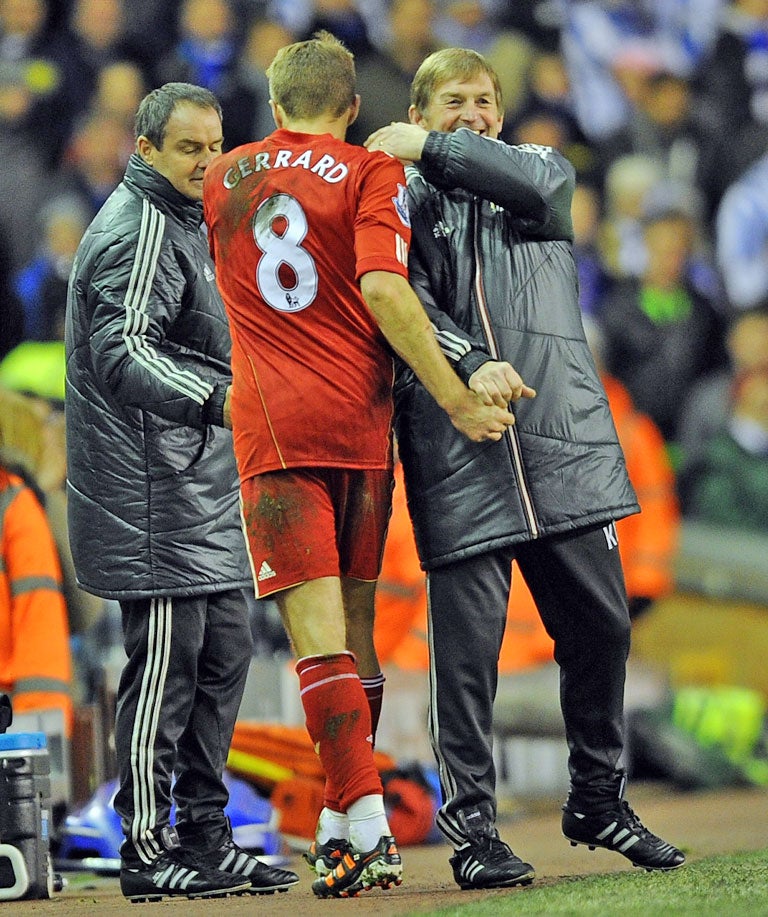Cup succour can sustain Dalglish's fragile recovery
Liverpool manager keen to narrow gap with elite by continuing his side's rich Wembley tradition

It might now have lost its lustre but the League Cup was written through Liverpool's history in the days when success was weighed in silverware, rather than the honour of finishing fourth in the league. An image of Bob Paisley in his Hitachi-sponsored tracksuit top, clutching the three-handled pot in the Anfield sunshine in 1981, was given the same prominence as Phil Thompson lifting the European Cup in Paris on the cover of the following season's yearbook, and Paisley explained why the competition mattered so much. "It guaranteed our 18th consecutive season in Europe," he said, "which is always our basic aim."
It was also the last domestic competition to evade Liverpool's clutches and when the 20-year hex had finally been broken, in a replay against West Ham United on April Fool's Day 1981 which saw Kenny Dalglish maintain a record of scoring in every round, the floodgates opened. A total of 11 trophies followed for Liverpool in the next four years. They included four successive League Cups and though a typically unforthcoming Dalglish said yesterday that he could not recall his best memory of Wembley from the days when Liverpool attended so often they knew it as "Anfield South" – "I don't know. Not too many. I just cannae remember," he said – the 1982 triumph over Tottenham must surely be an indelible one. Record gate receipts of £720,000 at a packed Wembley, Ronnie Whelan's 87th-minute equaliser, Dalglish's gorgeous pass for Whelan to score again and Ian Rush, a Wembley debutant, finishing things off.
With such emotional capital, it is little wonder that Dalglish can hardly disguise his bemusement at the lack of worth which this competition now holds for clubs. "[Things] have changed," he said. "Maybe that's why people have thought that keeping their teams in the Premier League is more important than going to Wembley. That's their prerogative. It's their football club. It's their decision. Nobody else's."
There has been no obscurity about Dalglish's decision-making. He simply wanted some silverware to begin the long road back to something approaching the days of '81, so Luis Suarez played in the 3-1 second-round win at Exeter City, just as Dalglish did in a 6-0 demolition job at the same ground en route to winning the 1982 Milk Cup. (The deep Merseyside recession meant the 11,478 attendance for the Exeter home leg was the lowest on record for a senior game at Anfield: the '80s were not sunny in every way for L4.)
So now Dalglish finds himself on the cusp of the silver which has eluded his club for six years and, though he rejects the idea, Sunday also represents a first staging post on the route out of the most difficult period in the club's history. What Paisley, part of Anfield from 1939, would have made of the notion of Liverpool going to the High Court to wrest control from their American owners is as unimaginable as the very real threat of administration, which stalked the club in the dog days of the Tom Hicks and George Gillett era. "I don't think it is right to compare the football club with what has happened at Rangers," Dalglish said, but the comparison was by no means unreasonable.
The recovery is still terribly fragile and Dalglish is guarded against proclaiming this can be a catalyst, in the same way that 1981 proved to be. "We are not going to jump ahead of ourselves and take anything for granted. We are not going to set ourselves up to be fired at," he said.
But the emotion written across his face when Liverpool overcame Manchester City in a two-legged semi-final – the same opposition they overcame in the 1981 semi when he scored in the Anfield second leg – revealed just what the club carry into Sunday. In '81, it was a fairly visceral type of desperation to win the competition. The previous four seasons had brought three semi-final appearances, including the defeat to Nottingham Forest in an Old Trafford replay and a decisive John Robertson penalty so controversial that Ian Callaghan received his only booking in 640 appearances. Now, 31 years on, there is a broader kind of desperation: to restore the place among football's challengers which belonged to Liverpool in that era and – equally significant after the dreary controversy of the past few months – a sense of dignity.
"It is more than just winning trophies," Dalglish said. "Somebody once described Liverpool to me as 'very good winners' which is really difficult. It is difficult when you're a winner to be friendly, amiable and respectful but I think that is the greatest compliment anyone has ever paid this football club. When they were flying, they were good winners. I just haven't a clue who said it! It might have been [my wife] Marina! [Wembley] was a place which we once visited pretty regularly and everybody at the club is trying to get back a bit closer to those days."
Dalglish can actually become only the third manager, after Sir Alex Ferguson and Jose Mourinho, to have clinched the full range of English domestic honours by the time Sunday evening comes around – though his response to that notion reflected the fact that he has a distance to travel before he stands in the sunny place the tracksuited Paisley once occupied. "We are not going for selfishness or individual glory," he said. "We are going to better the football club."
Join our commenting forum
Join thought-provoking conversations, follow other Independent readers and see their replies
Comments